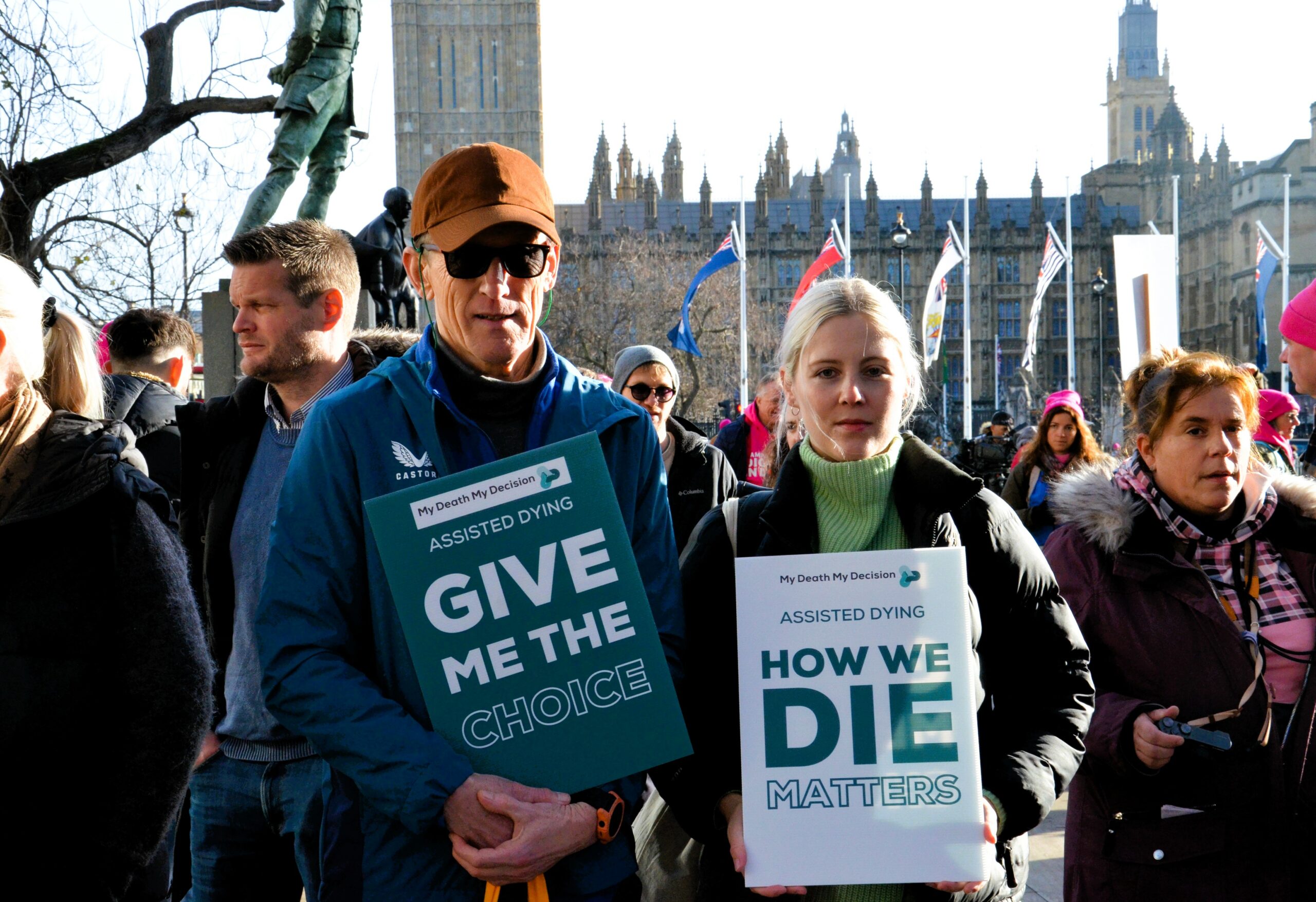
Photo credit: Kerry Hogan/My Death, My Decision
The Assisted Dying Bill has passed its first major vote in Parliament, called the Second Reading. This means MPs have agreed to the general idea of the Bill, with 330 votes in favour and 275 against. The next steps involve carefully checking all the details and deciding if anything needs to be changed. Here’s a simple guide to what happens next:
Key Dates to Remember
- December 2024: A small group of MPs will start examining the Bill in detail during something called the Committee Stage.
- Mid-April 2025: The Committee must finish its work by this time so the Bill can move forward.
- 25 April 2025: All MPs will look at the Bill again and vote on any changes during the Report Stage.
- May–July 2025: The Bill will be examined by the House of Lords
- 11 July 2025: This is the final deadline for everything to be agreed for the Bill to become law.
What Happens Next?
Step 1: Committee Stage
- The Bill now goes to a smaller group of MPs, chosen to reflect a mix of opinions from Parliament. This group is called the Public Bill Committee.
- The Committee will go through the Bill line by line, checking it carefully, fixing any problems, and suggesting improvements. These suggestions are called amendments.
- To help them make decisions, the Committee might ask for evidence. This could include:
- Inviting experts (like doctors, legal professionals, or campaigners) to share their opinions in person.
- Asking organisations or individuals to send in written evidence, which is a way of explaining their views.
- If the Committee decides to ask for evidence, they will explain how people can send their views and set a deadline for submissions.
- Once this is finished it will move on to the Report Stage
Step 2: Report Stage
- At this stage, all MPs—not just the ones on the Committee—can suggest changes. These changes will be debated, and MPs will vote on whether to accept them.
- The Speaker of the House, who is in charge of keeping debates organised and fair, will decide which changes get discussed.
- The Speaker may choose to group some of the changes together, to help keep the time and make it easier for MPs to vote on it.
Step 3: Third Reading
- After the Report Stage, MPs will have a final chance to debate and vote on the whole Bill, including any changes that have been made. This is called the Third Reading.
- MPs could vote against this at the third reading – which would stop the Bill altogether.
Step 4: The House of Lords
- If the Bill is approved by MPs, it will move to the House of Lords. The Lords are not elected like MPs but include experts and experienced figures from different areas of life.
- The Lords will go through a similar process: debating the Bill, suggesting changes, and voting.
- If the Lords make changes, the Bill will go back to the Commons for MPs to decide if they agree.
Other Steps That Need to Happen
Money Resolution
- The Bill will need approval for any costs it creates, such as funding for the NHS or the courts. This is called a money resolution, and it is essential for the Bill to continue.
- Only the Government can put forward a money resolution, and delays could slow down the Bill’s progress.
- This should happen fairly quickly, and will include a shorter debate of up to 45 minutes.
Technical Changes
- The Government might suggest small changes to make sure the Bill fits properly with existing laws. These changes usually happen during the Committee Stage to avoid causing delays later.
Discussions with Wales
- Because health policy is managed separately in Wales, the UK Government will need to talk to Welsh leaders about how the Bill will work there. The Welsh Parliament has already raised concerns about the idea of assisted dying, which could lead to disagreements.
Frequently Asked Questions?
Why is there so much emphasis on time and deadlines?
- This is a private members bill – which is where an individual politician brings forward a change in the law. Because it’s not the government trying to change the law there are extra rules – some previous attempts to change the law have failed because they’ve not had enough time to get through all the stages.
Does the recent vote mean I can have an assisted death now?
- No. The 2nd reading vote that happened on the 29th November was just about the general idea of the Bill. It needs to pass all the stages outlined above first. Even after it passes all those stages, there will be an implementation period first of up to two years.
Who will be able to have an assisted death if this passes?
- Right now, the Bill is only for people who have six months left or fewer, and the person will need the sign off of two doctors and a high court judge.


